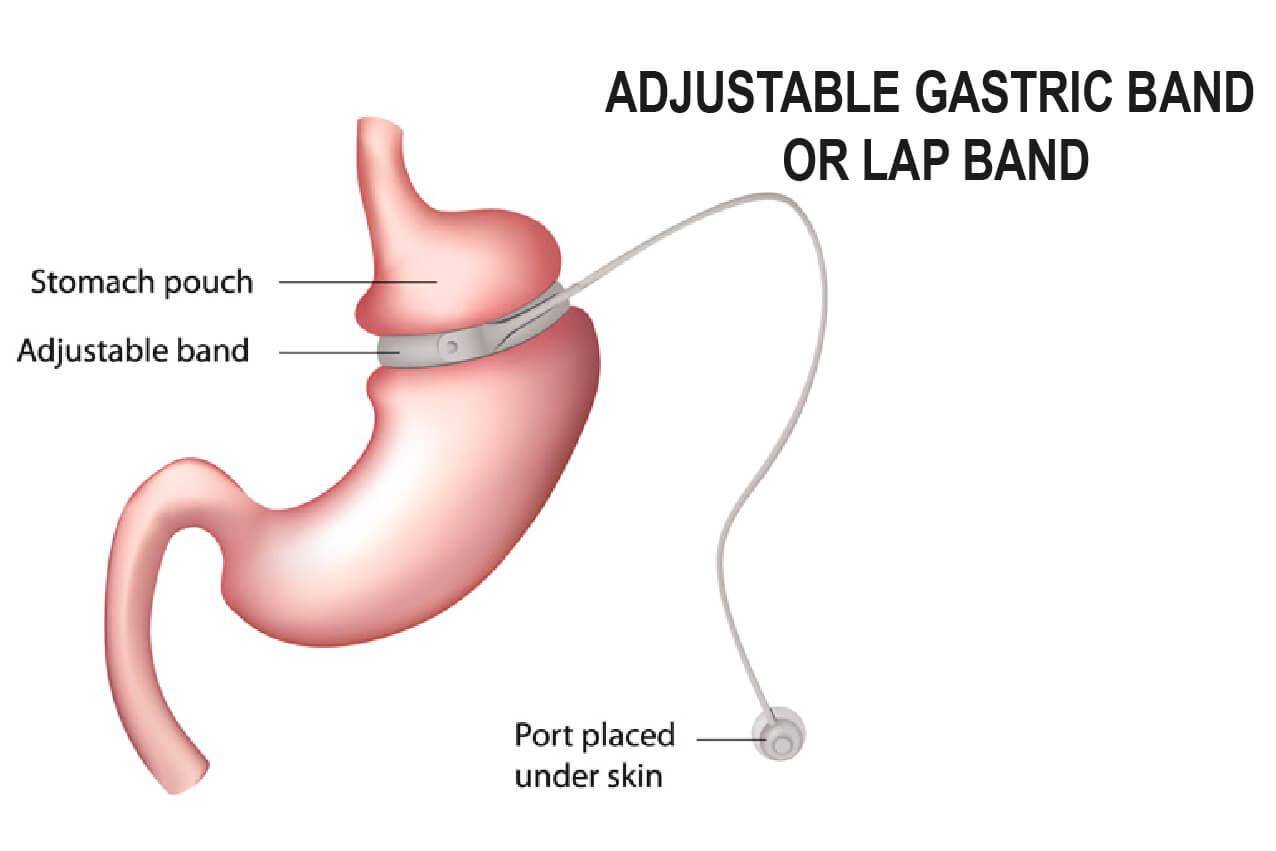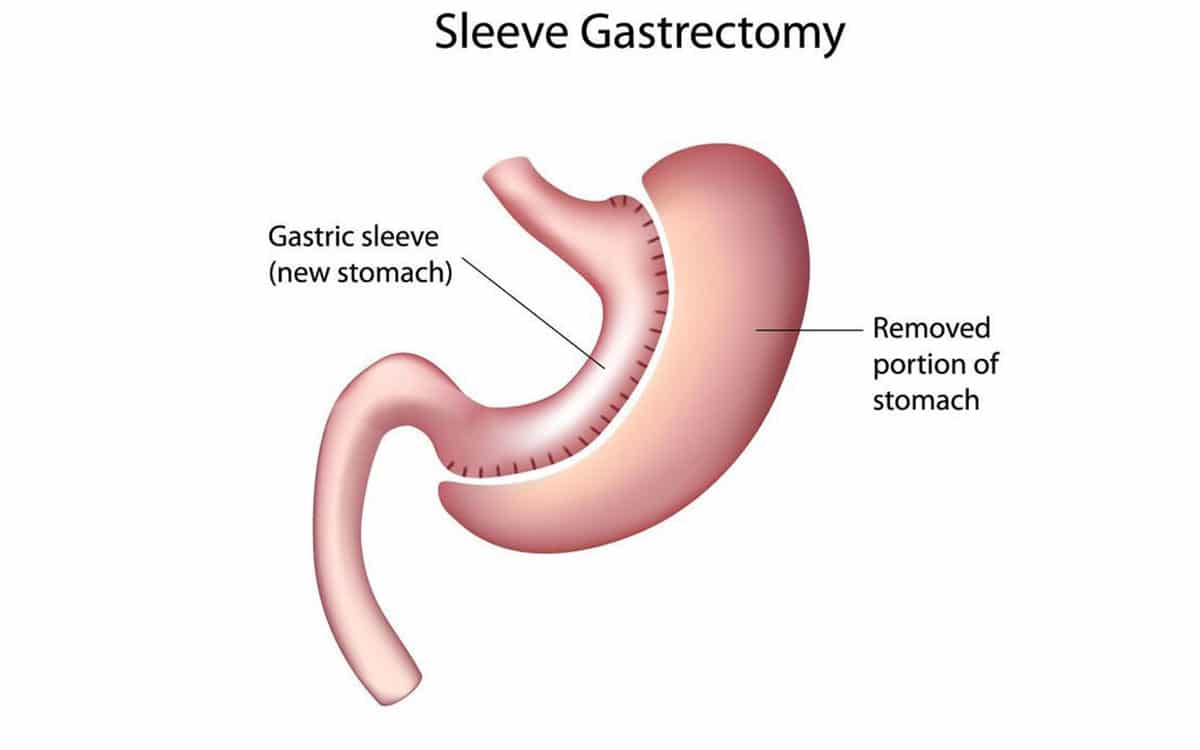Table of Contents
Weight Loss Surgery Or Bariatric Surgery: Should You Consider Going Through It?
Weight loss surgery or Obesity surgery or Bariatric Surgery is performed for those people who are suffering from a condition of obesity for the long term and need a faster form to reduce weight. There are many people who are not able to reduce weight through diets and workouts and go through many predicaments due to obesity like heart diseases, stomach issues, etc.
The hormones of the gut are altered in these procedures taking place in the weight loss surgery that leads to weight loss. These surgeries are hormonal in nature.
Let’s study all the information related to weight loss surgery in detail to understand better whether you should proceed with the weight loss surgery or not.
What Is Weight Loss Surgery?

Another term used for weight loss surgery that is very common today is Bariatric Surgery. It is a common term used collectively for various types of weight-loss surgeries performed one after the other.
The main aim of these surgeries is to make changes in the gut or digestive system of a person that aids in weight loss. These surgeries either puts a limit on the amount of food intake and reduce the body’s ability to absorb minerals and nutrition. Such kinds of surgeries are performed when all the exercises and diets have failed and you have not received any results.
People also opt for weight loss surgery when the weight causes serious health problems that may have adverse effects on the health of people. The most common type of bariatric surgery is Gastric Bypass. Usually, all surgeons prefer Gastric Bypass because it has fewer complications than other surgeries and is more successful.
However, it is important to note that these types of surgeries generally have side effects and major risks. Also, the person undergoing this surgery are advised to stick to a particular diet and remain strict. Fixed exercises should also be done to enjoy all the benefits of weight loss surgery.
Different Types Of Weight Loss Surgery
There are 5 major types of surgeries when it comes to weight loss surgery. These are:
BPD/DS or Biliopancreatic Diversion and Duodenal Switch

This type of surgery is not done on a high scale and is less common than others. It has two major steps. The first step is known as Sleeve Gastrectomy. In this step, 80% of the stomach of a person under operation is removed and a small tube-shaped stomach is inserted instead of the original. 20% of the stomach which comprises the pyloric valve that is meant for releasing the food into the small intestine is left as it connects to the stomach.
The final step or the second step is to pass most of the intestinal to the duodenum that is situated near to the stomach. After the surgery gets over the amount of food intake you consume generally reduces along with nutrients like fats and protein.
Usually, both the steps are performed at once one after the other but there are certain cases when sleeve gastrectomy is performed first and bypass methods are performed later. The gap between both these steps occurs once the weight loss begins after the first step. Performing both the steps separately happens very rarely.
Even though the results of this surgery are effective, there are many complications and risks involved. This surgery is done only for people who have a body mass index above 50. This category involves people who are highly obese.
Endoscopic Sleeve gastroplasty

This is the latest type of weight loss surgery. It involves a reduction in the size of the stomach of a person with the help of an endoscopic suturing device.
If a person has tried and tested all sorts of exercises and workouts and none of them worked then this surgery is performed. Anyone who has a body mass index above or near 30 can go for this surgery after trying diets and workouts of different kinds. This surgery also limits the amount of food intake. It is not very risky and the complications involve are also less compared to the first surgery.
Weight loss is observed early in this weight loss surgery.
Gastric Bypass or Roux-en-Y

Roux-en-Y bypass surgery or Gastric Bypass surgery is another weight loss surgery. It involves the connection of a small pouch that is present in the stomach to the intestine directly. After the connection, the swallowed food passes directly from the pouch present in the stomach to the small intestine without accumulation of food.
It is one of the most preferred and common procedures for weight loss. It is again performed when any workout or diet proves to be ineffective for a person.
Intragastric Balloon

Silicon material is used to make a balloon filled with saline is placed into the stomach in this weight loss surgery. This surgery is good because it helps the person feel full very fast and the portions are also very small as compared to the normal eating habit.
Sleeve Gastrectomy

This is also called vertical sleeve gastrectomy and is a surgical weight-loss procedure. It is carried out using the laparoscopy method. Various types of small instruments are taken to make multiple cuts on the stomach. A major part of the stomach is removed and a tube is placed to carry out all the process of digestion efficiently to reduce weight.
Is Weight Loss Surgery The Right Option For You?
After having read about all types of surgeries involved in bariatric surgery you are still left with a question that which is the right one for you among so many types and is it the right decision to go through surgery to lose weight? Keep reading to know.
These surgeries might not be beneficial or useful for all people. These are only performed when threats related to health are very fatal that can lead to serious ussies later.
Let’s see each surgery type and if it is fit for you or not.
Biliopancreatic Diversion With DS (Duodenal Switch)
This surgery is only performed when people having obese have a high risk of following diseases or problems.
- High BP
- Heart diseases
- Severe sleep issues
- High cholesterol
- stroke infertility
- Type II diabetes
Various screening processes are carried out to test whether you are in need of this weight loss surgery or not.
Endoscopic Sleeve Gastroplasty
As mentioned above this procedure is only for those who have their BMI higher than 30 and are not able to lose weight through various exercises and diet patterns.
However, there are some exceptions when it comes to opting for this surgery or not. The people who have gastrointestinal bleeding and a Hiatal hernia of more than 3 or 4 cms are not advised to go for this surgery. Also, if you have previously gone through any abdominal surgery, it is highly recommended to visit doctors and go through screening tests.
Gastric Bypass
This weight loss surgery is suitable for you if you have the following:
- Your body mass index is higher than 40 or nearly 40.
- If you have high BP issues, severe sleeping apnea, or diabetes type 2 with BMI between 35 to 30, then also you are suitable to undergo this surgery.
- When the case becomes very severe, people having a BMI of 33 or 35 also have to undergo this surgery to prevent a major loss.
Intragastric Balloon
This surgery type is highly recommended for:
- People having body mass index between 30 and 40
- People are willing to go through behavioral therapy to live a healthy lifestyle with strict diets.
- Previously did not have any surgery related to esophageal and stomach.
Sleeve gastrectomy
It is recommended for people:
- Having a body mass index higher than 40 or extremely obese.
- Severe health issues related to obesity.
Risk And Complications Of Weight Loss Surgery
There are a lot of risk factors associated with these weight-loss surgeries. All risk factors are mentioned below:
- Excessive bleeding
- Side effects of anesthesia
- clotting in blood
- infections
- breathing problems or lung-related issues
- leaking in gastrointestinal
- Bowel obstruction
- Gallstones
- Dumping syndrome
- Hernias
- Malnutrition
- low blood sugar
- Hypoglycemia
- Ulcers
- Vomiting
- Stomach pain and perforation
- Nausea for quite a few days (can be treated with medicines, often seen in Endoscopic sleeve gastroplasty but generally recovers in few days.
- Pain
- Deflation of balloon in case of Intragrastic balloon surgery
- Blockage leading to the need for another surgery
Results Shown By Each Weight Loss Surgery

Depending upon the type of bariatric or weight loss surgery, the results shown are also different depending upon the body mass index of a person going for surgical methods to get rid of fat.
1. Biliopancreatic diversion with duodenal switch
In this type of weight loss surgery, there will be significant and evident weight loss in the first 1 or 2 years after the surgery has been carried out. The weight loss will be around 70 to 80% of the total unwanted fats.
It also depends upon the person and their lifestyle. They might not follow healthy procedure and lead to a failed effect of surgery. But all the predicaments related to obesity and weight loss will not be seen anymore after 2 to 3 years.
2. Endoscopic Sleeve gastroplasty
It is modified and new than other weight-loss surgeries and provides great results. The weight loss is evident in the first few months itself. You can expect a time period of 6 months to reduce a lot of weight.
If a person has a body mass index ratio of 38 or 38, he may be transforming into a good shape by reducing around 17 kilograms of weight in the first 6 months itself. Further, he may reduce 19 to 20 kilograms of weight within a year which is brilliant as per requirements, and prevent diseases related to overweight or obesity.
Also if a person had a body mass index of 44, he may end up reducing about 33 kilograms of weight in just 6 months, however, these results are not absolute and just indicative varying from person t person, their lifestyle, and other habits.
3. Gastric Bypass
Long term weight loss is desired by all whoever is looking for weight loss surgery. This procedure involves weight loss in long term. Again, weight loss solely depends upon the person and what changes he brings to his eating habits and lifestyle in order to maintain his weight.
After a successful surgery, you can expect a weight loss of 60% in the first 2 years, which is great.
4. Intragastric Balloon
This surgery is quite different from others although it provides similar results. It will make the person feel completely full in just a small portion of food they intake due to which they will eat very little food resulting in weight loss. You may observe a weight loss percentage of 15 to 20 in the first few months itself.
There are certain changes in hormones when it comes to Intragastric balloon surgery that helps in controlling the appetite which makes hunger vanish with few bites.
5. Sleeve Gastrectomy
A great weight loss is seen. A person will lose 60% weight in the first year or after 2 years given that they stick to a proper diet routine and builts a healthy lifestyle to savor the changes made.
Cost Of The Entire Weight-loss Surgery
Although it might seem an easy process to lose weight, it is not meant for everyone as you have to go through different screening tests before you are verified for surgery which includes BMI above 30 and failed results due to various workouts and diet plans.
The cost of weight loss surgery is quite high. It ranges from 2.5 lakh to 3 lakh (Indicative). This cost depends on different factors that include:
- Surgery type among the given 5 types of bariatric surgery.
- The fee took by the surgeon varies depending upon the surgeon.
- Type of hospital you chose.
- Instruments and their usage
- Anesthesia
- Different procedures carried out
- consultancy
You may also claim insurance after proving all the proofs related to your surgery type.
Ways To Maintain Weight After The Bariatric Surgery

The success of a weight loss surgery entirely depends upon lifestyle and behavioral changes opted by patients. Patients are advised to strictly stick to a diet plan provided by their dietician which is designed specifically keeping a lot of things in mind.
Keeping a count on calories and nutrition along with workout should be made a priority.
Before the surgery has taken place you have to reduce weight near the liver and region of the abdominal area to reduce the risk of any complications in the surgery. The doctor provides you a weight goal that you have to achieve before proceeding with the surgery and if you fail to come down to that weight, Doctors might cause a delay as the risk is high.
Let’s see what and all you may eat before and after the surgery.
1. Before Surgery Meal Plan
These are some guidelines you are supposed to follow before going for surgery.
- Do not believe in binge-eating. It should be avoided.
- Avoid beverages that are high in sugar
- Take multivitamin supplements to complete the daily dose of vitamins and nutrition.
- Consume protein daily
- Avoid food that is high in carb intake
- Saturated fats should be eliminated from the diet.
2. After Surgery Meal plan
Pre-surgery diet plans are not divided into many stages and few guidelines are initiated by dieticians that you should keep a check on. However, post-surgery meal plans or diet plans are bifurcated into different stages based on your intake by a dietician or doctor.
First Stage Or Liquid Diet Stage
Initially, after the surgery has taken place successfully, only liquid meal plans are recommended to avoid complications and pressure on your stomach. These are a few types of liquid meals you may take after consulting your doctor.
- Skimmed Milk
- Coffee or tea that is not caffeinated.
- Broth and soup
- Gelatin sugar-free in nature
- Unsweetened juices
Stage two Involves Pureed Diets
pureed food refers to the food having a consistency similar to a pudding that may be blended at the house. Do not jump to spices in the second stage itself as they might harm or cause irritation in the stomach which is not good at this time.
It is advised to eat fruits that are seedless and eliminate fibrous fruits. Some fruits you might consume are bananas, apricot, peaches, pineapples, pears, and melons. The doctors may also suggest some veggies like spinach, tomato, carrots, and green beans.
Stage 3 Involves Soft Diet
At this point in time, the dietician will recommend you to intake food items that are not hard to chew, soft, and easily digestible. These include:
- Ground meat
- boiled eggs
- canned fruits
- cooked whitefish
- cottage cheese
- yogurt
- ricotta cheese
- chicken
- turkey
- beef
- scrambled eggs
Stage 4 Is Stabilizing Stage
This is probably the last stage where you can consume solid food and incorporate it into your daily diet. You can start this stage after 2 or 2.5 months of surgery. Remember to chew the food properly and before that, you have to divide your solid meal into very small portions or pieces as your stomach is small during this time and improper chewing will lead to discomfort in the stomach. Although you are allowed to intake solid meals, there are some food items that are highly avoidable like:
- popcorn
- dried food
- fried meals
- tough meat
- crunchy food
- Products of bread
3. Guidelines On How To Eat
After the surgery, you cannot afford to bring back your original way of eating and lifestyle that you maintained before surgery that had led to obesity and disease risk. The guidelines mentioned should be kept in mind and followed for lifelong to remain healthy and in a good lifestyle. These guidelines include:
- Take your time while eating. Drink and eat properly and slowly.
- Learn to control your portions
- Pay attention if your body is showing any signs related to discomfort and act accordingly
- Avoid highly sweetened beverages
- Remain hydrated and keep your bottle with you
- Break down food into smaller pieces and chew each piece slowly many times
4. Mandatory Changes In Lifestyle

Do not get over-excited and jump to cardio or difficult workouts immediately or after few days from the surgery. Give your stomach and body the time to heal from risky surgeries and go for low impact workouts at the beginning. Avoid sitting at the same spot for the whole day as these were few reasons that led to obesity in the first place. Simple changes in your routine can be proven to highly beneficial for you. You may start with following low impact exercises or workouts and continue over time after consulting your doctor.
- walking
- stretching
- Beginners Yoga
- Breathing exercises
- Climbing the stairs instead of using a lift.
5. Deal With Loose Skin or Muscles

After the surgery, you are more likely to have loose muscles and skin. You can do cardio and other weight loss exercises that may help you get rid off saggy skin. However, if you are not in the state of such harsh workouts and tired of saggy skin, there are some cosmetic surgeries for you.
- Facelift surgeries to help get rid of sagging skin in the neck, jaw, etc.
- Tummy tucks
- Thigh lifts
- Arm lifts
- Lower body lifting
- Breast lifts
Remember these surgeries are cosmetic in nature and you have to consult doctors before proceeding with any of the surgery.

